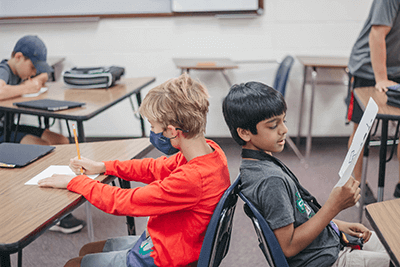September 29, 2022
 from Dr. Bill Hudson, head of school
from Dr. Bill Hudson, head of school
Is there a cliff involved? It’s a question I frequently ask myself or my husband Ross. It comes from MPA’s former school psychologist, Steve Kahn, and is one of the best pieces of parenting advice I have ever received. In fact, it came up over this past weekend when Ross had reached a point of frustration with our 16-year-old daughter. He was venting over her making time for soccer, friends, and her boyfriend but not for her behind-the-wheel driving experience. “At this rate, she’s never going to get her license!” he exclaimed. Calmly, I looked at him and said, “Is there a cliff involved?”
My article last week focused on forging a strong parent-school partnership and I wrote about parenting being demanding, lonely, and hard. It’s hard to find the balance between allowing our children to have agency and to make their own choices without overparenting, micromanaging them, or preventing them from failing. This is particularly difficult when it comes to school. Many of us have a hard time keeping school performance and homework in perspective.
You’ve heard me say a number of times that parental engagement plays an important role in academic success. Researchers Wendy Grolnick (Clark University) and Eva Pomerantz (University of Illinois/Urbana-Champaign) analyzed decades of research on parent involvement and found that it is “an important and necessary ingredient in children’s academic adjustment” and can contribute to student motivation, engagement, and learning. Studies have found that this is especially true when parents’ role is affectively positive (showing joy, love, and satisfaction helping their children) and when it promotes children’s autonomy.
Many years ago, when I was conducting research for my dissertation and when learning management systems such as Schoology were first introduced, I interviewed a ninth grader who bemoaned the fact that his parents often knew before he got home for school that he didn’t turn in an assignment or was called to the principal’s office. “Geez,” he said, “I don’t even get a chance to take care of it myself before I get in trouble at home.” Sound familiar?!
Grolnick and Pomerantz encourage parents to give students developmentally appropriate autonomy and create a supportive environment within which parents do not micromanage their kids’ homework. Otherwise, parents run the risk of diminishing and undermining children’s own motivational resources. The challenge of parenthood is to provide the environment so that our children can be who they really are. It isn’t to remove obstacles but to be by their side to support our children when they encounter them.
Parenting does not have to demanding, lonely, or hard. MPA is here to support and partner with you. One of the most valuable opportunities to forge a strong relationship with the school is parent-teacher conferences. As you prepare for parent-teacher conferences tonight and next week, the Harvard Graduate School of Education published a useful tool for you: BE HEARD.
Best intentions assumed
Emphasis on learning
Home–school collaboration
Examples and evidence
Active listening
Respect for all
Dedication to follow-up
As you prepare for conferences, you may also be interested in this resource published by the National Association of School Psychologists: Teacher Conferences—A Guide for Parents. You can be confident that teachers welcome the opportunity to partner with you and are eager to work together to ensure your children’s success.
And please remember that if you find yourself at risk of going over a cliff, we are here to help. I look forward to seeing you soon.